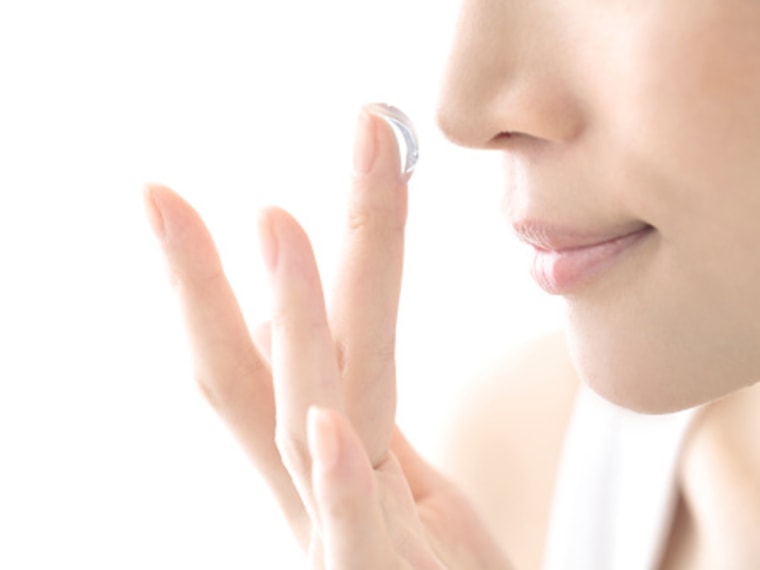
Martin Kyran spit into a vial, handed it to the DNA tester and hoped for the best. The 39-year-old marketing manager wasn't undergoing medical tests, nor was he being investigated for a crime. The truth is, he had a wrinkle.
“I spend a great deal of time exercising and eating right, but I’m not getting any younger,” Kyran told TODAY.com. “This test let me know how I'll age and what I need to buy to look after my skin."
He's just one of the many men and women turning to DNA technology in an effort to treat and prevent skincare issues by matching topical products to their genetic profiles. It appears the ultimate in personalization, but is a genetics-based skin regimen smart – or a bit silly?
Overseas, English women in search of the perfect glow can swing into The Organic Pharmacy, take a simple saliva test and receive their DNA makeup (and recommended skin care products) in 30 minutes flat.
“We’ve created an anti-aging consultation which takes into account a GeneOnyx DNA test, along with a detailed and personalized lifestyle analysis,” said Organic Pharmacy owner Margo Marrone. “We then determine a list of ingredients in our products that the client can best metabolize.”
Are you prone to dark spots, stress or dehydration? Are you a low metabolizer of collagen? If you can’t answer these questions, geneOnyx developer Christofer Toumazou says it may be cause for concern.
“If you don’t know your skin’s genetic profile, some of the products you’re using could be hurting your skin,” explained Toumazou. "This isn't just about beauty; it's about skin health and detecting problems early. This is about the life of your skin and the true meaning of anti-aging, not simply a placebo effect."

"Recreational genetics," as Toumazou calls it, empowers the consumer to make scientifically sound decisions, a solution for those who have walked out of Sephora with their heads spinning or used skin prescriptions without really knowing what’s in the tube. "For every drug, there should be a genetic test to determine if one can metabolize those ingredients properly," he said, predicting that "personalized medicine will be the future.”
Dr. Ruthie Harper certainly thinks so. Her SkinShift DNA test and skin-care products are available to youth-seekers in the U.S. by mail. Harper says her clients are concerned about preventing premature aging, but that the test also addresses serious skin issues like inflammation (rosacea, eczema and acne) and hyperpigmentation. “This report gives you a road map to understanding the strengths and weaknesses of your individual body as it relates to your skin,” she said. “DNA testing is a scientifically based decision which targets skin issues from the both the inside out and the outside in. People have really attached to this concept.”
But is the concept legit? According, to the FDA, no. Michelle Bolek, a spokesperson, confirmed that no medical claims have been proposed by skin care companies utilizing DNA testing. “In order for these tests to be subject to FDA regulation, they would need to make a medical claim,” she said. She also found that the FDA has not cleared or approved any devices for DNA testing of this variety.
Dermatologist Dennis Gross, a board-certified dermatologist and dermatological surgeon in New York City, is skeptical. “Matching your skin cream to your DNA isn't an effective way to choose anti-aging products," he said. "The mechanisms and science of aging in human skin is very much understood ... treatments that target common reasons for aging are effective for all humans. They will neither metabolize faster nor be less effective due to lack of DNA matching."
Dr. Tony Nakhla, medical director of the OC Skin Institute in California and author of The Skin Commandments: 10 Rules to Healthy, Beautiful Skin, shares Gross's sentiment. “There is no scientific rationale for testing someone’s genetic makeup to tailor a skin care regimen around it. To date, none of the information being touted has been scientifically proven,” he said. “There are genetic disorders that involve the skin – if you’re testing for one of those, it’s an elaborate test. There’s no real rationale for a hokey DNA test. I tell people that they can probably do better with an over-the-counter product for a fraction of the price.”
But that doesn't stop some folks from shelling out a pretty penny for a chance to have healthier skin. Skinshift’s DNA test clocks in at $299, while GeneOnyx is available at TheOrganic Pharmacy for $472. While that’s a hefty price tag for most, Kyran says the results have been well worth the cost.
"In the past, certain products made my skin react badly and made my complexion feel sore and look damaged,” said Kyran, who claims he started seeing the results of his new DNA-tested skin care purchases after only the second day. He says that his skin is much more firm and toned, and that he no longer has dry patches on his face and neck. “Everyone who spends money on skin care regularly should have the test done," he recommended. “Otherwise, you don’t know how your genes truly affect your skin. You can waste a lot of money on creams that don’t match…I only wish this had been around in my 20s. I would have been so much wiser!”
Harper says the bulk of her customers are men and women in their 40s and 50s, but that she is seeing more interest from the 20 to 30 age brackets.
“I think this younger demographic sees the value of having a strong preventative program,” she said. “They understand that genetics are the key to discovering our bodies. They’re our skin horoscopes."
More from TODAY Style: